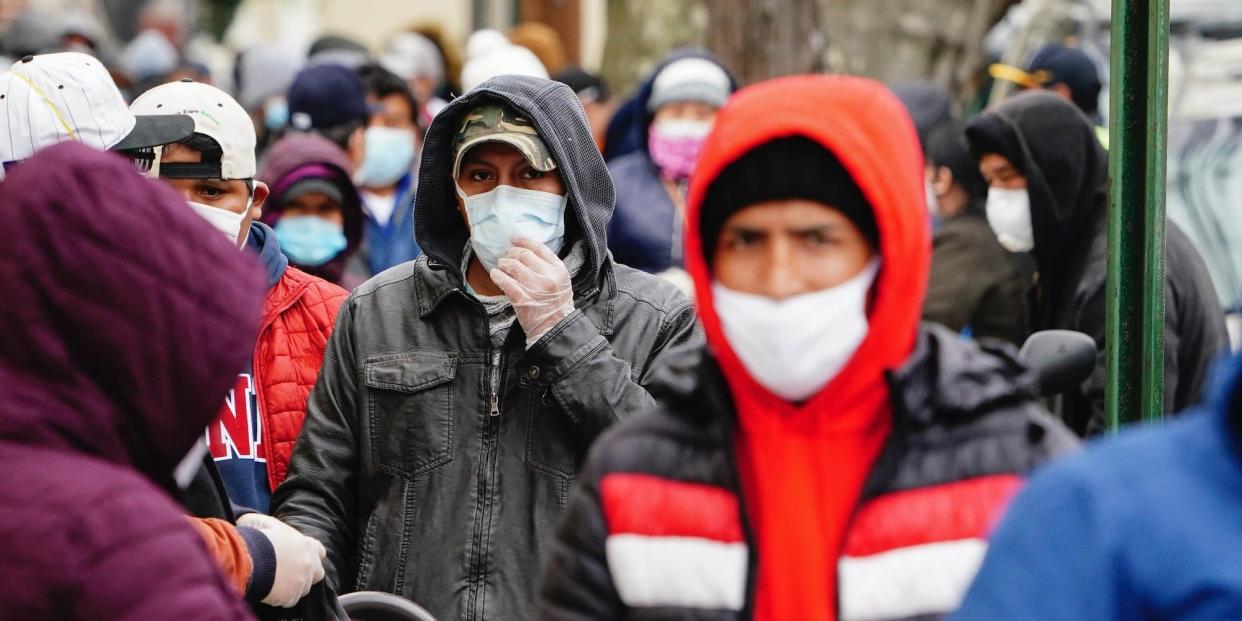68% of people tested at a New York clinic had coronavirus antibodies, raising hopes that some communities will be able to resist a second wave

John Nacion/STAR MAX/IPx 2020 5/6/20
Over two-thirds of people tested at one New York City clinic tested positive for antibodies to the coronavirus.
The findings raise hopes that some communities which were most exposed to the virus in the first wave may be best protected from a second one.
68% of those tested at a clinic in Corona, a predominantly Hispanic working-class neighbourhood in Queens, tested positive for coronavirus, according to the New York Times.
This compares to just 13% at a more affluent neighbourhood in Brooklyn.
Over two-thirds of people at a clinic in one New York neighbourhood tested positive for coronavirus antibodies, raising hopes that large parts of some communities may have some protection during any potential second wave of infections later this year.
According to a New York Times report, 68% of those tested at a clinic in Corona, a predominantly Hispanic working class neighbourhood in Queens, tested positive for antibodies to the coronavirus.
At a different clinic in Queens, the figure was 56%. However, at a more affluent neighbourhood in Brooklyn, only 13% of those tested had antibodies for the virus, the Times reported.
The news raises the possibility that communities in the city which were hardest hit by the virus — areas where many residents are Black and Latino and on lower average incomes— may be better positioned to avoid a second wave of the virus later this year.
Meanwhile, more affluent communities may be more vulnerable to the virus spreading, if antibodies do prove to offer medium- or long-term immunity to the virus.
The antibody results were shared with the New York Times by CityMD, a firm which runs medical clinics and urgent care centres. CityMD carried out 314,000 antibody tests in New York City during the period, of which 26% came back positive.
However, the high presence of antibodies at the two Queens clinics — where the tests were carried out between late April and June — does not necessarily indicate that the same high proportion of people across the whole community will carry antibodies.
For one, a group of people who sought tests at urgent care clinics are more likely to have been infected with the virus than a representative sample of the local population.
Furthermore, scientists are still unsure how long antibodies last and how long someone who has been infected with the virus is immune for afterwards.
Dr Anthony Fauci, the top infectious disease expert in the US who is helping to lead the government's coronavirus response, said in April that people then recovering from Covid-19 would likely be immune until at least October.
But evidence from a June study in Spain indicated that antibodies may only last for two or three months. In a separate study published this week in the Lancet, a medical journal, researchers found that people who had been infected often shedded antibodies from the virus after only a few weeks.
That would mean that antibodies offered little protection in a few months time to those who had already been infected with the virus.
"Immunity can be incomplete, it can be transitory, it can last for just a short time and then disappear," said Raquel Yotti, the director of Spain's Carlos III Health Institute, who helped carry out the study.
Read the original article on Business Insider

